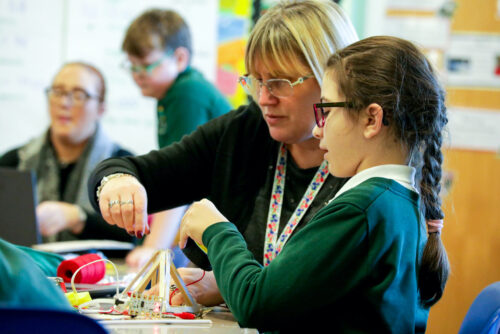Computer programming is now part of the school curriculum in England and many other countries. Although not necessarily the primary focus of the computing curriculum, programming can be the area teachers find most challenging to teach. There is much evidence emerging from research on how to teach programming, particularly from projects with undergraduate learners. That’s why I recently wrote a report summarising over 170 programming pedagogy papers: Teaching programming in schools: A review of approaches and strategies.

I hope this blog post about how I approached writing the report whets your appetite to read it, and encourages you to read more research summaries in general.
My approach to summarising research papers
Summarising findings from more than 170 research papers into 34 pages was not a task for the faint-hearted. I could not have embarked on this task without previous experience of writing similar, smaller reviews; working on a host of research projects; and writing reports about research for many different audiences.

I love reading about computer science education. It evokes very strong emotions, making me by turns happy, curious, impressed, alarmed, and even cross. When I summarise the papers of other researchers, I am very careful when deciding what to include and what to leave out, in order to do the researchers’ work justice while not overselling it or misleading readers. Sometimes research papers can be hard to fathom, with lots of jargon and statistics. In other papers, the conclusions drawn have many limitations: the project the paper describes hasn’t produced robust enough evidence to give a clear, generalisable message. Academic integrity and not misrepresenting the work of others is paramount. And naturally, there are many more than 170 papers about teaching programming, but I had to stop somewhere. All this makes summarising research a tricky task that one has to undertake with great care.

Another important aspect of summarising research is how to group papers. A long list saying “this paper said this”, “this paper said that” would not be easy to access and would not draw out overall themes. Often research studies span many topics. What might be a helpful grouping for one reader might not be interesting for another.
For this report, I grouped papers into three sections:
- Classroom strategies: Here I included well-researched classroom strategies that teachers can use to teach programming in schools
- Contexts and environments for learning programming: Here I outlined research related to opportunities for teaching programming, including different programming languages and the classroom context
- Supporting learners: Here I summarised research that helps teachers support learners, particularly learners who have difficulties with programming
Why you as a teacher should read research summaries
Teachers, as very busy professionals, have little time to replan lessons, and programming lessons are challenging to start with. However, the potential long-term benefit may outweigh the short-term cost when it comes to reading research summaries: new insights from firmly grounded research can improve your teaching and enable more of your learners to be successful.

The process of translating research into practice is an area that I and the research team here are particularly interested in investigating. We are looking forward to working with teachers to explore this.
The Raspberry Pi Foundation regularly shares research summaries in the form of:
You can also check out other computing education podcasts e.g. CSEdPod.org, as well as computing education books (e.g. The Cambridge Handbook of Computing Education Research, Computer Science Education: Perspectives on Teaching and Learning, and many others), and other researchers’ blogs about computing education (e.g. Amy Ko, article summaries on CSEdresearch.org).
Website: LINK

